Travel rewards credit cards are known for their attractive sign-up bonuses and flexible redemption options. They go beyond regular credit cards by offering exclusive travel credits and a range of benefits that enhance the joy of exploring the world. These cards are specifically designed to cater to the needs of frequent travelers, providing generous rewards and personalized perks.
To identify the top travel rewards credit cards, we conducted a thorough analysis of various cards in this category. We considered a diverse range of issuers to curate a list of the very best options available. Our selections are based on extensive research and comparison.
It’s important to note that our list is not exhaustive, and there may be other credit cards that suit your unique needs better. We recommend comparing our chosen cards with those featured on our list of the best credit cards. This will allow you to evaluate them in a broader context and make an informed decision.
Capital One Venture X Rewards Credit Card

The annual fee for the Capital One Venture X Rewards Credit Card is $395. You can earn 2 miles per $1 on purchases, 5 miles per $1 on flights booked through Capital One Travel, and 10 miles per $1 on hotels and rental cars booked via Capital One Travel.
When you spend $4,000 on purchases in the first three months of account opening, you can earn a welcome bonus of 75,000 miles. There is no foreign transaction fee associated with this card.
The Capital One Venture X Rewards Credit Card provides various benefits. It offers a $300 annual statement credit reimbursement for travel bookings made through Capital One Travel. Additionally, you can enjoy airport lounge access, cell phone protection, and the ability to transfer miles to airline and hotel partners.
The miles earned with this card do not expire, and there are no blackout dates when booking with Capital One. Cardholders also receive Hertz President’s Circle status. Until May 16, 2023, you can earn 10 miles per dollar spent on rentals with Turo.
Chase Sapphire Reserve

The Chase Sapphire Reserve credit card has an annual fee of $550, with an additional $75 per authorized user. You can earn 5 points per $1 spent on flights and 10 points per $1 spent on hotels and car rentals through Chase Ultimate Rewards® after spending $300 on travel purchases annually. For other travel and dining expenses, you earn 3 points per $1, and for all other purchases, you earn 1 point per $1. As a welcome bonus, you can earn 60,000 points by spending $4,000 on purchases within the first three months of opening the account.
There is no foreign transaction fee associated with this card. Apart from the benefits mentioned above, the Chase Sapphire Reserve offers a $300 annual travel credit, access to airport lounges (including Chase Sapphire Lounges and the Priority Pass Select network), food delivery service memberships, and 1:1 points transfer to numerous airline and hotel loyalty programs. Additionally, it provides travel, car rental, and purchase protection. However, it’s important to consider the high annual fee.
Bilt World Elite Mastercard
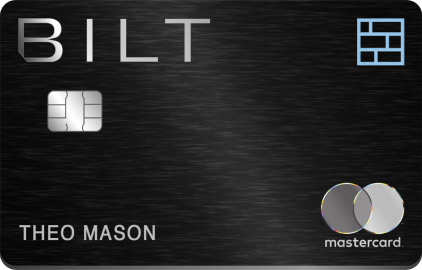
The annual fee for the Bilt World Elite Mastercard® is $0. You can earn 1 point for every $1 spent on rent payments without a transaction fee, up to a maximum of 100,000 points per year. For travel expenses booked through the Bilt Travel Portal or directly with airlines, hotels, car rentals, or cruise companies, you earn 2 points per $1. Dining purchases will earn you 3 points per $1, while other purchases will earn 1 point per $1. To qualify for these rewards, a minimum of five transactions must be made per billing period.
The Bilt World Elite Mastercard® offers unique benefits such as the ability to redeem points to pay for rent and the option to transfer points at a 1:1 ratio to various airline and hotel partners. Furthermore, the card provides additional perks like an auto rental collision damage waiver, trip delay reimbursement, and trip cancellation and interruption protection.
Chase Sapphire Preferred® Card
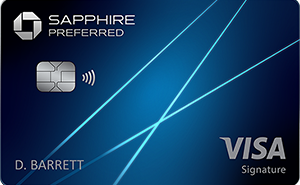
The Chase Sapphire Preferred® Card has an annual fee of $95. It offers various rewards for different types of purchases. You can earn 5 points per $1 on travel through Chase Ultimate Rewards®, 3 points per $1 on dining, select streaming services, and online grocery purchases (excluding Walmart, Target, and wholesale clubs), and 2 points per $1 on other travel purchases. Additionally, you earn 1 point per $1 on all other purchases.
As a welcome bonus, you can earn 60,000 points by spending $4,000 on purchases within the first three months of opening the account. The card has no foreign transaction fees, which can be beneficial for international travelers.
Compared to the higher-tier Chase Sapphire Reserve®, the Sapphire Preferred® is more affordable. It offers similar rewards such as travel and purchase protections. However, the Reserve provides 50% more value when redeeming points for travel through Chase Ultimate Rewards, whereas the Sapphire Preferred offers 25% more value.
The Chase Sapphire Preferred® Card also provides additional benefits. It offers an annual bonus point award equal to 10% of your total purchases made in the past year. Additionally, you have the flexibility to transfer points on a 1:1 basis to loyalty partners. These features make the card an excellent choice for those seeking competitive benefits without a steep annual fee, while still enjoying the perks of a travel rewards card.
United℠ Explorer Card
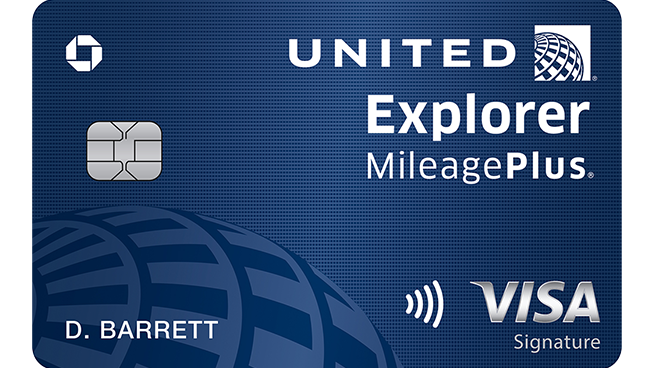
The United Explorer credit card has an annual fee of $0 for the first year, and then it is $95 per year. With this card, you can earn 2 miles for every $1 spent on dining, eligible delivery services, hotel stays, and United purchases. For all other purchases, you earn 1 mile for every $1 spent. Additionally, there is a welcome bonus of 60,000 miles when you spend $3,000 on purchases in the first three months of opening the account. The card has no foreign transaction fees.
In terms of benefits, the United Explorer card offers a range of perks. Cardholders enjoy a free checked bag, priority boarding on United flights, and 25% back as statement credits on in-flight purchases. Furthermore, the card provides reimbursement for application fees for Global Entry, TSA PreCheck, or NEXUS every four years. Additionally, cardholders receive a complimentary one-year membership to DoorDash DashPass.
The World of Hyatt Credit Card
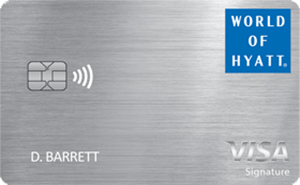
The annual fee for the World of Hyatt Credit Card is $95. As a World of Hyatt member, you can earn a total of 9 points per $1 spent at Hyatt hotels — 4 points from the hotel and 5 base points from Hyatt. You can also earn 2 points per $1 at restaurants, on airline tickets, local transit, commuting, and fitness club memberships. For all other purchases, you earn 1 point per $1.
As a welcome bonus, you can earn 30,000 points by spending $3,000 on purchases within the first three months. Additionally, you can earn up to 30,000 points by earning 2 points per $1 on up to $15,000 spent in the first six months of opening the account. After the initial period, the earning rate becomes 1 point per $1.
The World of Hyatt Credit Card has no foreign transaction fees. It offers various benefits, including a free night at any category 1-4 Hyatt hotel or resort after the card anniversary. This card is ideal for loyal Hyatt customers who frequently require hotel stays. It also provides travel and purchase protections and includes a complimentary DashPass membership for one year.
However, this card may not be suitable for individuals who frequent locations where Hyatt does not have properties.
Hilton Honors American Express Aspire Card
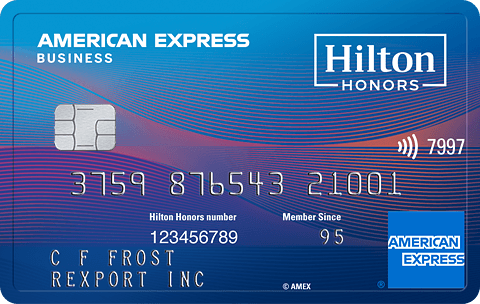
The annual fee for this card is $450, subject to terms and conditions. You can earn 14 Hilton Honors points per $1 spent at Hilton Portfolio hotels or resorts. Earn 7 points per $1 on flights booked directly with airlines or through American Express Travel. You can also earn 7 points per $1 on car rentals booked directly with select companies and at U.S. restaurants. For all other purchases, you will earn 3 Hilton Honors points per $1 spent. By spending $4,000 on purchases within the first three months of card membership, you can earn a welcome bonus of 150,000 Hilton Honors points.
There is no foreign transaction fee associated with this card. If you frequently stay at Hilton hotels or resorts and desire the additional perks of an American Express customer, this card may suit you. However, the high annual fee might be a deterrent for some individuals. The Hilton Honors Aspire card offers various credits to help frequent travelers offset the cost. It also provides benefits such as Priority Pass Select, complimentary Hilton Honors Diamond status, and an annual free night award. Enrollment is necessary to access select benefits offered by the card. Additionally, the card includes protections like return protection¹, baggage insurance², and auto rental collision damage waiver.
Wyndham Rewards Earner® Plus Card
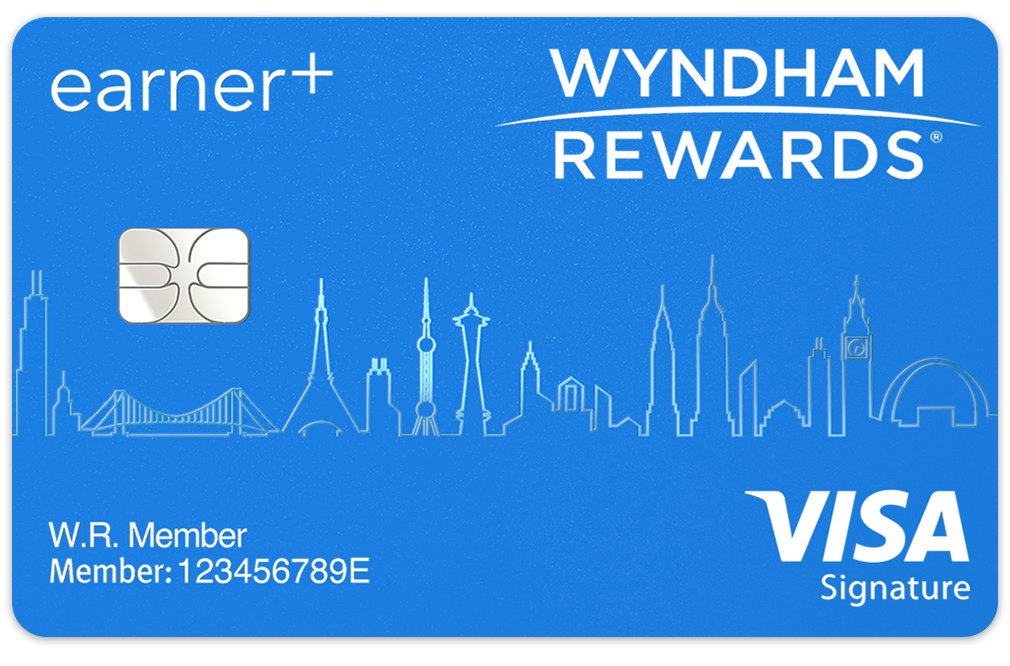
The card’s annual fee is $75. Rewards include 6 points per $1 for Hotels By Wyndham and gas purchases, 4 points per $1 for restaurants and grocery purchases (excluding Target and Walmart), and 1 point per $1 for all other purchases.
As a welcome bonus, spending $1,000 on purchases in the first 90 days of account opening earns you 75,000 points. Transactions made in U.S. dollars do not incur a foreign transaction fee.
The Wyndham Rewards Earner® Plus Card offers additional benefits. These include complimentary Wyndham Rewards Platinum membership, anniversary bonuses, and a cardmember booking discount.
Should you apply for a travel reward credit card?
Travel rewards cards offer a fantastic opportunity to maximize personal and business expenses for free flights and hotel stays. To make the most of these cards, ensure you select one that aligns with your preferred airlines and hotels. Consider the rewards offered by different cards and choose wisely based on your preferences.
Regardless of whether you travel frequently or occasionally, there is likely a travel rewards credit card tailored to your needs. Such cards can significantly enhance your savings and help you enjoy memorable getaways without breaking the bank.
Many travel rewards credit cards provide bonus rewards for various categories, including airfare, hotels, car rentals, and dining. Additionally, they often offer bonus points or miles when you meet a minimum spending requirement shortly after opening the account. These welcome bonuses can boost your rewards earning potential. Some cards also come with extra perks like travel protections, elite status in loyalty programs, priority boarding, and access to airport lounges.
While travel cards offer substantial benefits, they may not always be the optimal choice. It’s important to note that these cards often have high annual percentage rates (APRs). If you carry a balance on the card, the interest charges can accumulate quickly. In such cases, a credit card with a 0% introductory APR would be a better alternative. Additionally, keep in mind that travel cards typically require good or excellent credit. If your credit is poor or fair, you might have better chances of approval by applying for a secured card. By using a secured card responsibly, you can gradually improve your credit score over time.
Flexible rewards vs airline or hotel credit cards
Travelers who frequently journey should consider a card that earns flexible points or miles on every purchase. These points or miles are not restricted to a specific airline or hotel loyalty program. Instead, they can be redeemed through the card issuer’s travel agency program. Examples of such programs include Chase Ultimate Rewards and American Express Membership Rewards, with similar offerings available from Capital One and other major issuers.
For those who prefer a particular airline or hotel, airline- and hotel-specific cards provide rewards tied to loyalty programs. These cards often offer better value when used with the designated carrier or brand. However, they may have fewer redemption options compared to flexible points or miles cards. It is advisable to apply for this type of card only if you are certain about your preferred brand.
Occasional travelers may find a different type of reward card more suitable. Cash-back cards offer straightforward reward redemptions, allowing earned rewards to be used for future trips or exchanged for gift cards and other incentives. This option is beneficial if travel remains a priority but occurs less frequently.
Regardless of your traveler profile, there is likely a travel rewards credit card that can enhance the value of your trips. Before applying for any credit card, it is crucial to compare the available options to ensure the chosen card aligns with your specific needs and budget.
Evaluating reward potential
We assess travel rewards credit cards’ potential rewards by considering the average annual spending of a household in the 50th percentile of wage earners. This information is obtained from government and publicly available data.
On average, a household might earn approximately $84,352 per year, with about $25,087 spent using a credit card. Out of this credit card spending, around $2,941 is allocated to overall travel expenses, including $1,188 for airfare, $868 for hotels, and $885 for other travel purposes. However, frequent travelers who carry high-annual-fee travel rewards cards, such as the Capital One Venture X Rewards Credit Card, are likely to spend twice as much in these travel categories.
Considering the Venture X card’s earning structure, which offers 2 miles per $1 on purchases, 5 miles per $1 on flights booked through Capital One Travel, and 10 miles per $1 on hotels and rental cars booked via Capital One Travel, our hypothetical household could accumulate approximately 85,350 miles per year. It is important to note that this calculation assumes the spending categorized under “other travel” pertains to car rentals.
In conclusion, selecting the right travel card can result in substantial rewards. However, it is crucial to choose a card that aligns with your personal spending and travel habits, as the best card will vary from person to person.
